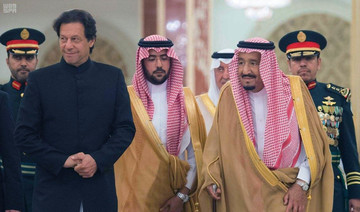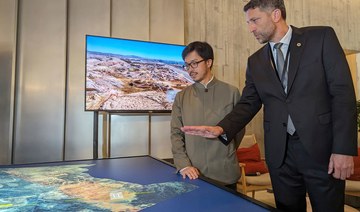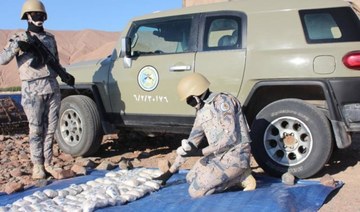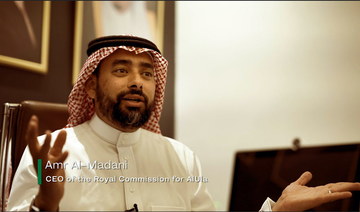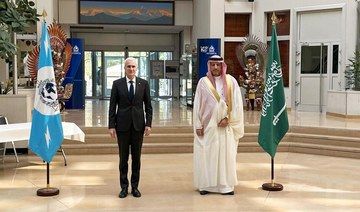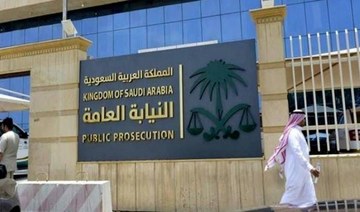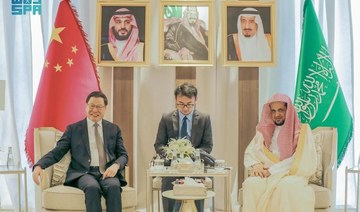JEDDAH: A joint venture to strengthen the Royal Saudi Naval Forces is to be set up between a state-owned defense firm and a French company specializing in naval defense.
The Saudi Arabian Military Industries Company (SAMI) and Naval Group signed an agreement on the sidelines of the International Defence Exhibition and Conference in Abu Dhabi.
The agreement sets out the framework for establishing the joint venture, which will strengthen the Kingdom’s efforts to localize essential industrial skills and capabilities.
SAMI aims to be one of the world’s top 25 military industry companies by 2030, and Crown Prince Mohammed bin Salman wants to localize 50 percent of Saudi military spending by 2030 also.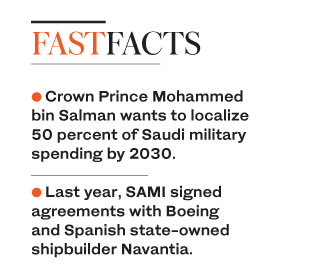
SAMI CEO Dr. Andreas Schwer said: “Our joint venture agreement with Naval Group laid the foundation of a strategic partnership that will reinforce SAMI’s commitment to helping Saudi Arabia develop self-sufficient defense capabilities. The collaboration offers us an excellent opportunity to leverage Naval Group’s strong track record of helping its partners develop sovereign defense capabilities to create an integrated military industries ecosystem in the Kingdom.”
“Through design, construction, and maintenance activities, the joint venture will contribute significantly to further enhancing the capabilities and readiness of our Royal Saudi Naval Forces.”
Last year, SAMI signed agreements with Boeing and Spanish state-owned shipbuilder Navantia.
Vision 2030 is highly reliant on the contribution of SAMI to the gross domestic product (GDP). According to the vision, the plan is to nationalize 50 percent of the military spending, and increase the contribution of the private sector to the GDP by 40-65 percent.
Public Investment Fund of Saudi Arabia expects SAMI to contribute almost $240 million to the national GDP by 2020, and to create 5,000 new jobs.
SAMI is set to become one of the top manufacturers globally, combining the latest technologies and best expertise to produce military equipment according to international standards and aid the development of the Saudi army.
The company’s strategy is based on implementing best practices from extensive studies in the industry, and collaborating with national and international partners.
SAMI designed their areas of operation to increase profitability and nationalization of the industry.
Saudi Arabian Military Industries and France’s Naval sign deal to build warships in the Kingdom
Saudi Arabian Military Industries and France’s Naval sign deal to build warships in the Kingdom
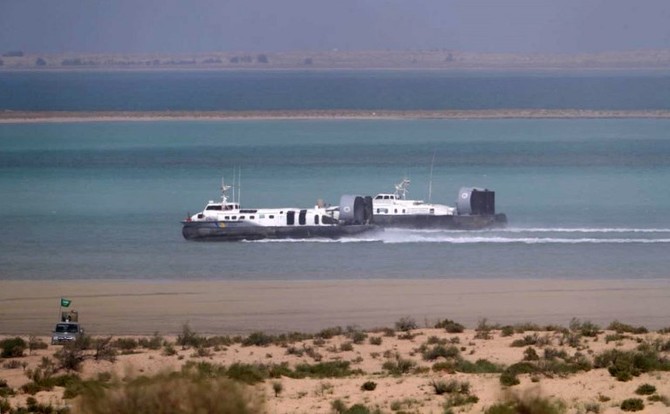
- SAMI is expected to create 5,000 new jobs
- Saudi plans to nationalize 50% of its military spending for Vision 2030
Hareed Festival: A window into the heart of the Farasan Islands

- Annual event highlights tourism potential
Riyadh: The Farasan Islands, a string of coral islands nestled 40 km off the coast of Jazan in the Red Sea, have been abuzz with activity recently as they hosted the 20th Hareed Festival.
This vibrant annual event celebrates the arrival of parrotfish, also called hareed, in the islands’ shallow waters, the Saudi Press Agency reported on Sunday.
The islanders have cherished this event for generations, transforming it into a social gathering that goes well beyond the arrival of the fish.

Visitors to the festival got a glimpse of the islands’ rich cultural heritage as it showcased the area’s unique customs, traditions, folk games, and handicrafts. It also focused its spotlight on Farasan’s remarkable tourism potential and historic sites.
Al-Dana provides one of the highlights. It is a captivating form of vocal art that is one of Farasan’s oldest folk traditions. It forms a poignant expression of longing, a result of the hardships endured by sailors on extended pearl-diving expeditions. The challenges faced by these brave men fueled the art form, which is deeply rooted in Farasan’s cultural identity.
The annual festival also gives an opportunity for Farasan residents to display their traditional handicrafts. Visitors can watch the making of fishing traps and nets, the intricate weaving of palm fronds, the creation of bags and rugs, and hat knitting.
A designated area at the hareed fishing site catered to families and children. Visitors could experience the thrill of catching parrotfish using a traditional method that involved setting up barriers to prevent the fish from escaping. This competition, a centuries-old tradition, allowed families to connect with the region’s fishing heritage.

Farasan’s most renowned tourist attractions highlighted the islands’ potential for tourism.
Al-Qassar village, which is located only 5 km from Farasan Grand Island, is a popular tourist site. This heritage village, which is built of stone and palm leaves, is home to the archipelago’s largest palm oasis.
Al-Qassar has served as a summer retreat for Farasan residents. People travel by camel to spend a three-month break in the village during the season of Al-Asef, the northwestern summer wind that comes after the hareed fishing season.
Famous for its abundance of fresh groundwater, Al-Qassar village comprises around 400 houses. These unique dwellings, with stone walls and roofs made of palm tree planks, leaves, doum palm, or anisotes trisulcus branches, topped with algae and mud, are made by traditional building techniques designed to withstand the elements.
The Hareed Festival is a window into the heart and soul of the inhabitants of the Farasan Islands; a celebration of culture, tradition, and the islands’ natural beauty.
Saudi Border Guard arrest 4 attempting to smuggle qat
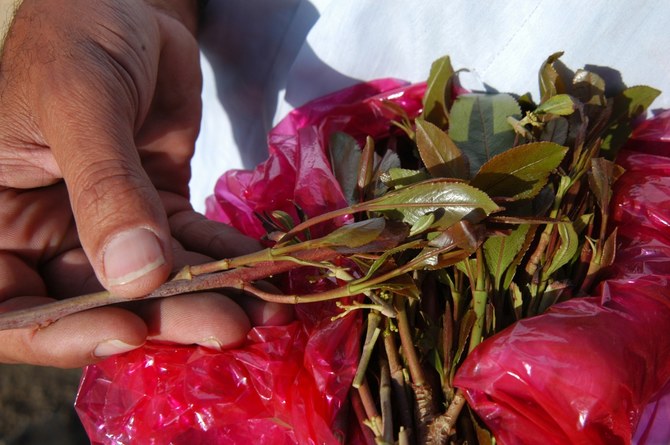
JAZAN: The Kingdom’s Border Guard in Al-Ardah, Jazan, recently arrested four Yemeni nationals attempting to smuggle 80 kg of qat into the country, the Saudi Press Agency reported on Monday.
Mostly chewed by users, Qat is a mild stimulant and illegal across most of the Arab world.
The government has urged citizens and residents to report any information they have regarding drug smuggling or sales to the General Directorate of Narcotics Control. Reports can be made by calling 911 for Makkah, Riyadh and the Eastern Province, and 999 for other regions. Alternatively, information can be emailed to [email protected]. All reports are treated confidentially.
KSrelief distributes food in Pakistan, drills solar-powered wells in Nigeria

DUBAI: KSrelief, Saudi Arabia’s aid agency, recently distributed 370 food baskets in the flood-hit Shangla district of Khyber Pakhtunkhwa province, Pakistan, benefiting 2,590 individuals.
The aid was a part of the fourth phase of the Kingdom’s Food Security Support Project in Pakistan 2024.
Last week, KSrelief, in collaboration with a civil society organization, initiated a project to drill six solar-powered medium-depth water wells in Kwara State, Nigeria. The wells, each at a depth of about 80 meters and equipped with tanks holding 5,000 liters, are for the benefit of 30,000 individuals.
The beneficiaries lauded Saudi Arabia for addressing their vital water needs.
Saudi anti-corruption authority reveals details of recent cases

- Spokesman said legal procedures had been initiated against all perpetrators
RIYADH: A spokesman for Saudi Arabia’s Oversight and Anti-Corruption Authority, also known as Nazaha, revealed on Sunday details of a number of criminal cases it recently investigated and prosecuted.
Outlining 20 of the most prominent corruption cases, he said legal procedures had been initiated against all perpetrators.
In one case, two Central Bank employees were arrested for receiving sums of money from a resident, who was also arrested, in exchange for depositing more than SR7.3 million ($1.95 million), without verifying the source, into bank accounts belonging to commercial entities over a two-year period.
In another case, a security officer working at the General Department of Traffic was arrested for receiving SR387,000 from the owner of a public services office, who was also arrested, in exchange for illegally amending the essential data of a group of vehicles.
One of the cases also highlighted involved an employee working at a university hospital who was arrested for receiving SR100,000 from citizens in exchange for a promise to employ them at the university.
Nazaha said it continues to work to identify and prosecute anyone in the Kingdom involved in the embezzlement of public funds, guilty of abuse of power and position for personal gain, or otherwise harming the public interest.
It stressed that guilty parties will be pursued and held accountable, and that there is no statute of limitations on such crimes.
Saudi, Bahraini public prosecutor meet in Manama
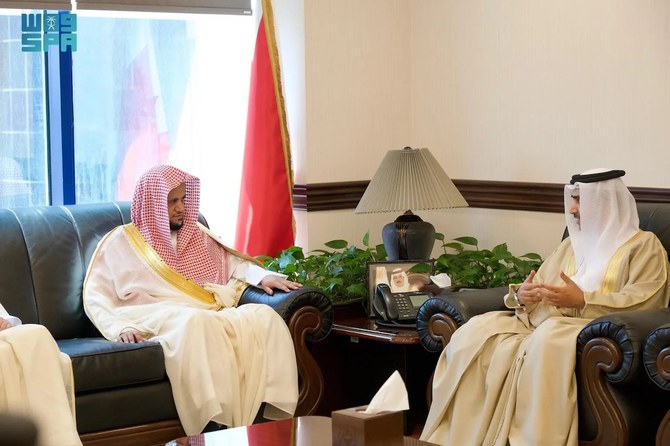
- Al-Mujeb highlighted the unwavering support the Kingdom's public prosecution receives from its leadership
RIYADH: Saudi Public Prosecutor Sheikh Saud bin Abdullah Al-Mujeb met with his Bahraini counterpart Ali bin Fadl Al Buainain in Manama, Saudi Press Agency reported on Sunday.
Al-Buainain welcomed Al-Mujeb and his accompanying delegation and expressed his delight at the visit, which he said signified the ongoing exchange of visits between the judicial bodies of the two nations and the sustained collaboration in combating transnational crime.
During the meeting, Al-Mujeb emphasized the deep-rooted historical ties between the Bahrain and the Kingdom and their continued advancement across various sectors, particularly in parliamentary cooperation and the exchange of information to ensure regional security.
He highlighted the unwavering support the Kingdom's public prosecution receives from its leadership, which he said enhanced the efficiency of its judicial processes.



